The disastrous impact of banks selling risky financial derivatives to farmers is still being felt in rural communities more than a decade later. How did it happen and how can we stop banks doing it again?
This story contains references to suicide and depression and also some emotional language.
Please use discretion and please seek help if you need it.
Rural advocate Janette Walker has a storage box at her house. She calls it her “suicide box.”
In it are letters from farmers - mostly men, mostly in late middle age - who tell her about the impact on their lives of the events surrounding the global financial crisis [GFC] back in 2007-2008.
The letters came to Walker as part of a research project she worked on in 2010 with Massey University banking specialist Dr Claire Matthews.
The farmers talk about being forced to sell their animals and their farms. About their humiliation and sense of failure. About feeling they had let down their fathers and their children. About depression and attempted suicide.
And they talk about being betrayed by the bank managers they thought were there to look after them.
But time and again, Walker says, the farmers wrote about one particular catastrophic event - the interest rate swaps crisis.
Subscribe to Two Cents' Worth for free on Apple Podcasts, Spotify, Stitcher, RadioPublic or wherever you listen to your podcasts
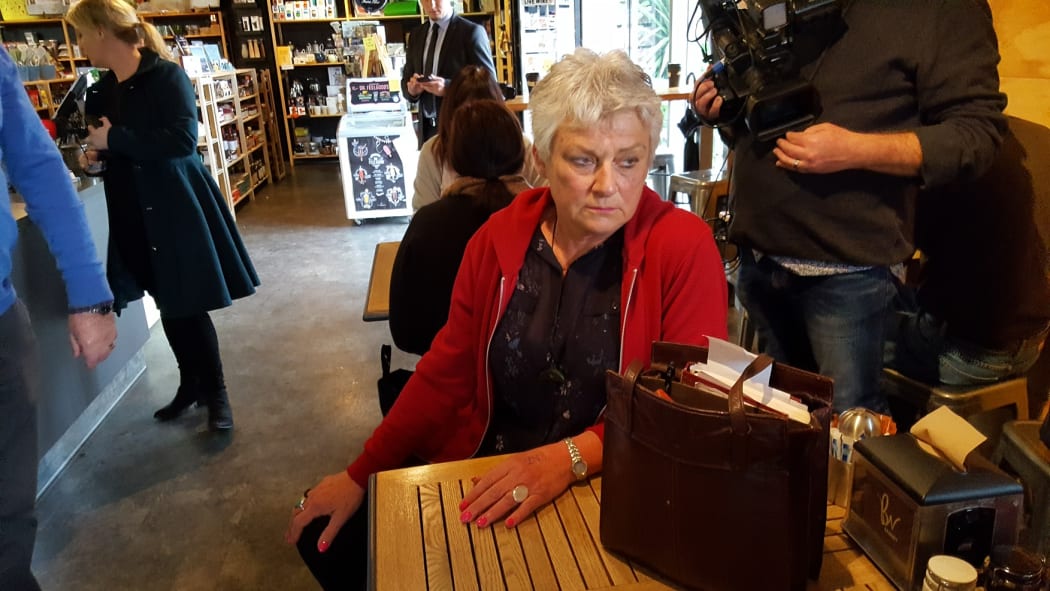
Labour candidate for Kaikoura Janette Walker. Photo: RNZ / Craig McCulloch
Walker had never heard of swaps back in 2010, although she had been through her own gruelling post-GFC experience with her bank, where she was forced to sell her farm.
“I farmed 2000 acres of my own, but when the GFC hit, my bank’s behaviour to me was horrible. I couldn’t understand it because I would have said I had a really good relationship with my bank until then.”
Despite not missing a mortgage payment, Walker says the bank took away her overdraft and then decided her business was no longer viable and they wanted their money back.
Walker believes the bank was wrong; that they forced her to sell up unnecessarily.
And as she pondered her own situation, she read about farmer suicides and she and Matthews designed a farmer questionnaire they published in the Farmers Weekly newspaper.
“We wanted to see how other farmers were feeling, so the questions were like: Have you had your overdrafts removed, have you had to work off-farm, do you trust your bank manager, do you feel confident with your business, do you feel confident with your bank?
“And we found all the horrible stuff that was happening to me, having my overdraft withdrawn, being forced to sell capital, stock, all that sort of stuff, was happening to other farmers.”
But many farmers also mentioned the impact of swaps.
Swaps are enormously complicated and risky financial derivatives. They are used - mostly by big businesses or international dealing rooms - to hedge against interest rate moves.
But in the period 2005-2008, New Zealand banks aggressively sold swaps to farmers as a supposedly less risky alternative to fixed interest loans, and a way for farmers to protect themselves from hikes in their mortgage repayments.
“Fixed rates with benefits” is how Walker puts the banks’ sales pitch.
Instead, interest rates tumbled after the GFC and farmers found themselves paying millions of dollars in extra premiums on their debt.
And instead of seeing them right, as their bank managers had promised, banks dumped on their customers.
Walker estimates up to 2000 New Zealand farmers lost up to $1 billion on swaps. They lost farms they had inherited from their fathers and planned to pass onto their children. Too many committed suicide.
Walker spent the three years following the Farmers Weekly survey doggedly researching banks’ sales of swaps to New Zealand farmers. And then she went to see the regulators.

Photo: RNZ / Alexander Robertson
“What banks did to farmers was just wrong. Although I didn’t have swaps, I knew how it felt losing my farm, so I could relate to these farmers. I don’t like people being ripped off and I don’t like dishonesty.
“I got as much information as I could, and I went to the Commerce Commission and arranged a meeting there. I literally had a box of stuff and I said ‘I’d like you guys to have a look at this.’ And I was there for a whole day and then they agreed with me there was something wrong.”
ComCom investigated and found three banks - ANZ, Westpac and ASB - had misled customers over the swaps.
A $25 million, commission-brokered settlement in 2013 offered farmers compensation, although that sum represented a tiny fraction of what they had lost.
The case of Angela Potroz
Take Angela Potroz, who lost her farms, her stock and her beloved husband John after the National Bank signed them up for interest rate swaps.
To hear Potroz’ harrowing story in her own words, click on the audio link at the top of this story and listen to the full podcast.
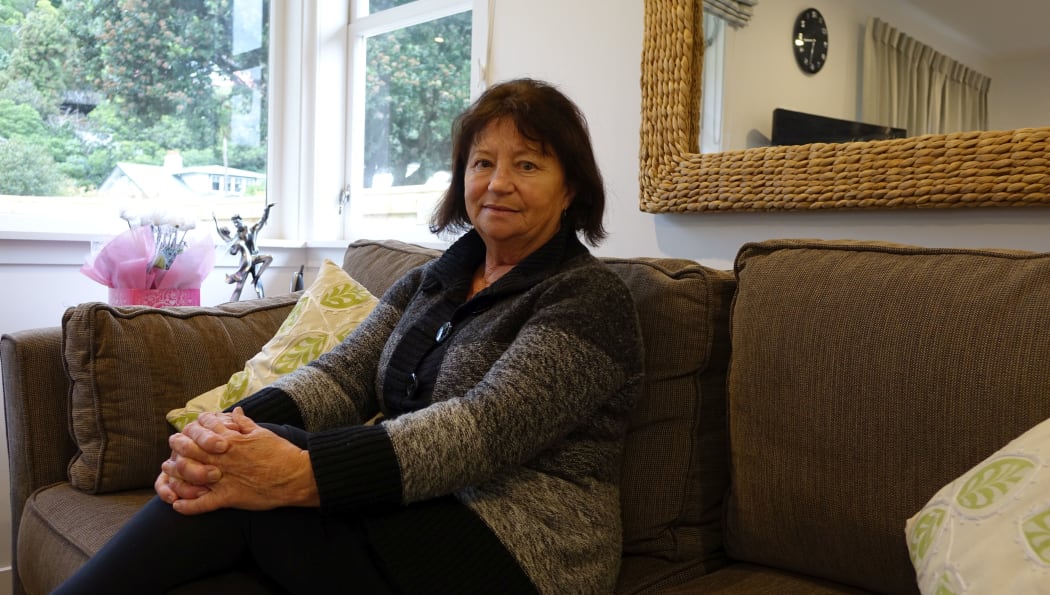
Angela Potroz Photo: RNZ / Jemma Brackebush
But the condensed version is that Angela and John Potroz built up a successful farming business from nothing, through sheer hard work.
In 2007 they got persuaded into swaps by the National Bank (part of ANZ Bank) and by 2013 they had lost pretty much everything. Ten days after the last farm was sold, John had a stroke and later died. Their son attempted suicide
The case of Bill and Sharon Coomey
Taranaki farmers Bill and Sharon Coomey were also sold swaps by National Bank. They didn’t end up losing everything, but they reckon swaps cost them $10 million. And it was touch and go about their farms.
They decided not to take the Commerce Commission brokered settlement ($155,000), instead choosing to sue ANZ to recover their full losses. After the High Court found in favour of the bank, three Appeal Court judges ruled that National Bank gave “false and misleading” information when it didn’t disclose the downsides of swap transactions compared to fixed-rate loans.
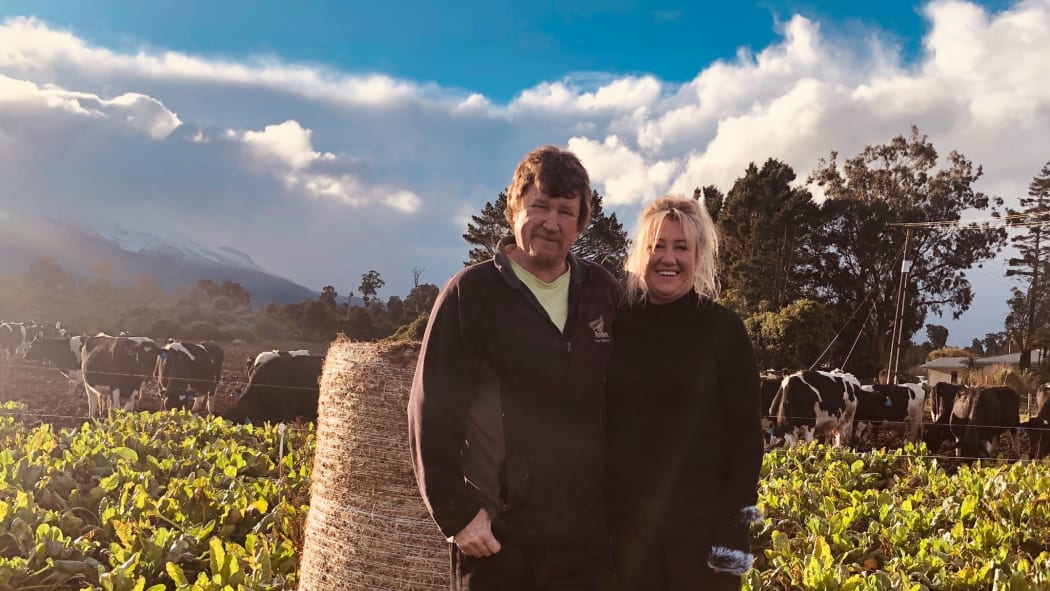
Bill and Sharon Coomey on their Taranaki farm Photo: RNZ/Nikki Mandow
The judges also found the Coomeys were right to think their 0.7 percent margin had been fixed for longer than ANZ later claimed it had. And they said ANZ had given every impression to the Coomeys the bank would look out for them. That included giving them options around the best time to get out of (“break”) the swap contracts.
For more on this case, see Newsroom’s story “The Taranaki farmers who took on a $81 billion bank - and won"
ANZ Bank appealed the judgement in October and the case now goes to the Supreme Court.
Why it matters
Walker doesn’t take out her suicide box anymore - it’s too emotional for her. But both she and her former research partner Claire Matthews agree the interest rate swaps debacle, the ComCom investigation, and the Coomey court case have far-reaching implications that are still relevant today.
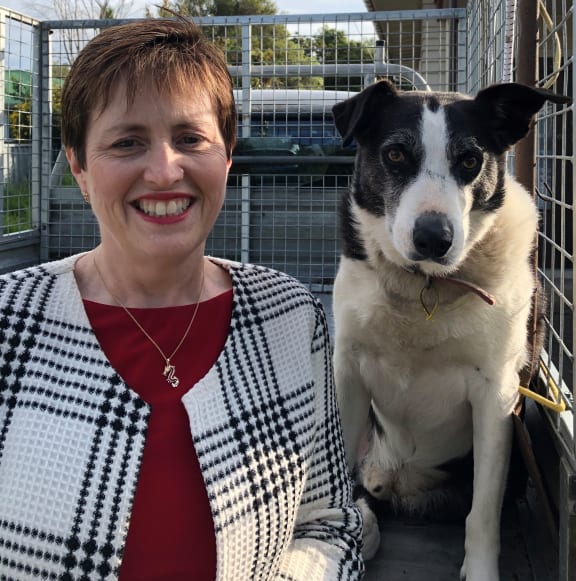
Claire Matthews and Bow Photo: RNZ/Nikki Mandow
“Banks will be looking very carefully at how they are doing things,” said Matthews, now director of academic quality for the Massey Business School. “And they will already be doing that because of some of the stuff coming out of the Royal Commission in Australia.”
Matthews is referring to the Hayne commission into Misconduct in the Banking, Superannuation and Financial Services Industry, which found widespread bad practice, slated bank executives and made 24 referrals to Australian regulators to take action.
Back in New Zealand, all three regulators (the Financial Markets Authority, the Reserve Bank, and the Commerce Commission) are looking closely at the banking industry, as is Consumer Affairs Minister Kris Faafoi.
The interest rate swaps will be one piece of the puzzle.
“Banks will be asking what are the lessons, what do we need to change to make sure going forward we don’t have this happen with a different product. It’s not so much just about the swaps but how do we make this not happen in the future.”
ANZ responds
The Australian-owned bank would not talk to Newsroom but sent an email.
“We’d rather not comment as settlements were reached years ago with businesses, either individually or through the Commerce Commission process, which concluded in 2014,” corporate affairs manager Stefan Herrick said. “We also have an appeal before the courts which makes it inappropriate to comment.”
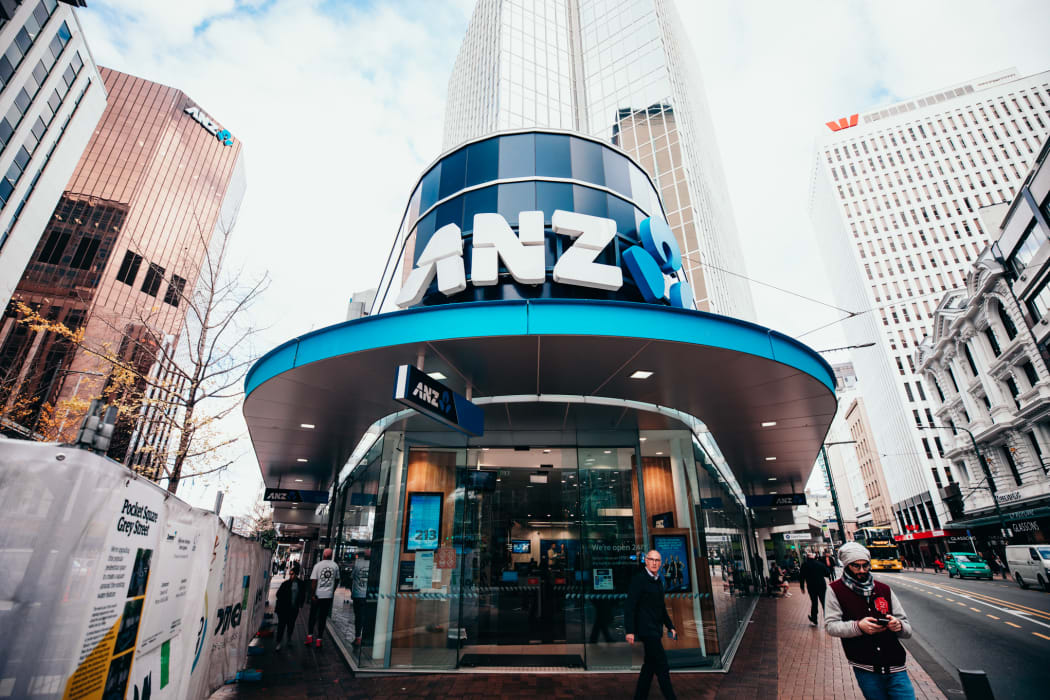
Photo: RNZ / Dom Thomas
So we asked the NZ Bankers’ Association for an interview. They also issued a statement, saying that bank conduct had improved over the last 10 years, with an increased focus on customer outcomes “aimed at avoiding a similar situation as that which occurred over ten years ago”, communications director Philip van Dyk said.
“Interest rate swaps remain a legitimate tool for helping to manage interest rate risk as long as those risks and benefits are well understood. They are a product used by many businesses to manage their interest rates.”
Could this happen again?
But is this all in the past, or could something like this happen again?
“There is the possibility,” Claire Matthews says. “Institutional knowledge disappears, so people don’t remember what happened before or they think it’s not going to happen this time. It’s human nature.”
She says banks are always looking for new products to sell to their customers, but the people selling those products don’t always fully understand them.
Like with the swaps, where bank managers stressed the upside for farmers but didn’t tell them about the downside and the risks. And the power imbalance means it’s mostly customers which come out the losers.
“If there’s not really strong regulatory oversight, there’s the risk that something similar could happen because people have forgotten the lessons of the past,” Matthews said.
Janette Walker said the swaps case is proof the regulators aren’t tough enough in New Zealand.
“What should have happened to the banks? They should have been slammed, like the Australian bankers, like happened in the UK, when similar swaps products were sold there.
“The carnage here was just the same; we should have been far more aggressive here but we weren’t.”
Walker said as a farm debt mediator she still sees the banks behaving ruthlessly with farmers.
“You have these back-of-house managers who sit on the other side of a table and just watch a farmer and his wife absolutely distraught, in tears, just about having heart attacks on the spot and they don’t give a shit, they seriously don’t give a shit.
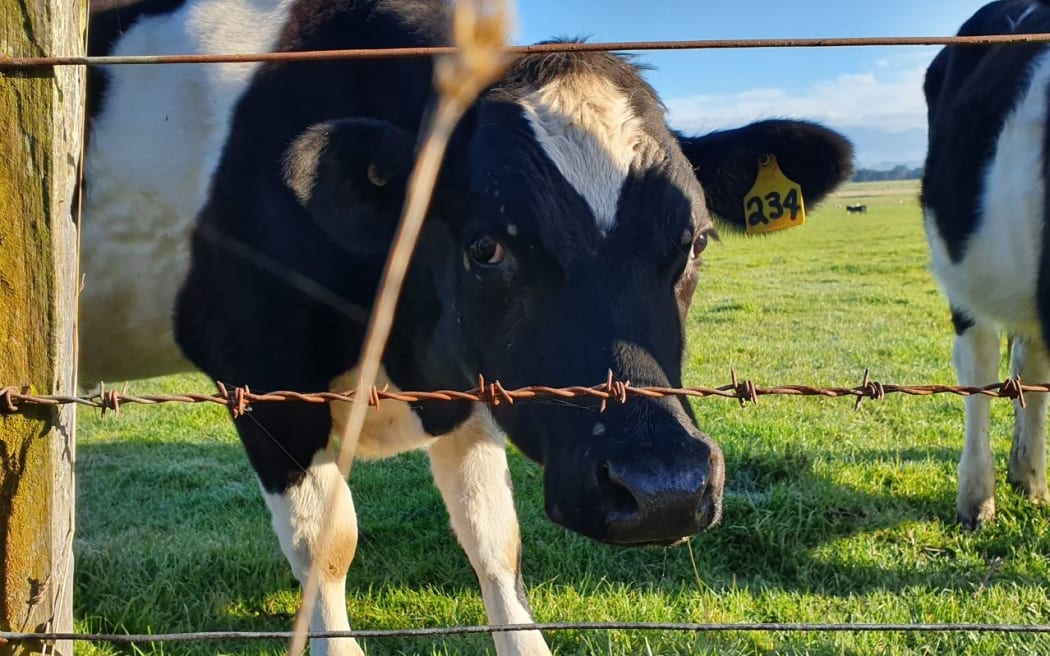
Photo: RNZ/Sally Round
These days it isn’t about swaps, she said, but issues like Mycoplasma bovis that have given banks an excuse to put pressure on farmers.
“Their argument is the business wasn’t viable in the first place and bovis has pushed them over the edge, but I think bankers are just using bovis as an excuse because once again the banks have overextended themselves in the rural sector.
“You’ve still got the same pressure being applied - taking away their overdraft, making them sell capital stock. They can see the physical and psychological harm they are doing because they are across the table from them, but they are hard people.”
Where to get help:
Need to Talk? Free call or text 1737 any time to speak to a trained counsellor, for any reason.
It’s Not OK – 0800 456 450
Lifeline: 0800 543 354 or text HELP to 4357
Suicide Crisis Helpline: 0508 828 865 / 0508 TAUTOKO (24/7). This is a service for people who may be thinking about suicide, or those who are concerned about family or friends.
Safe to Talk - Sexual Harm Helpline 0800 044 344
Depression.org.nz: 0800 111 757 (24/7)
Samaritans.org.nz: 0800 726 666 (24/7)
Youthline: 0800 376 633 (24/7) or free text 234 (8am-12am), or email talk@youthline.co.nz
What's Up (7pm-10pm) or 0800 WHATSUP / 0800 9428 787 children's helpline (1pm-10pm weekdays, 3pm-10pm weekends)
Kidsline (ages 5-18): 0800 543 754 (24/7)
Rural Support Trust Helpline: 0800 787 254
Healthline: 0800 611 116
Rainbow Youth: (09) 376 4155
If it is an emergency and you feel like you or someone else is at risk, call 111.

